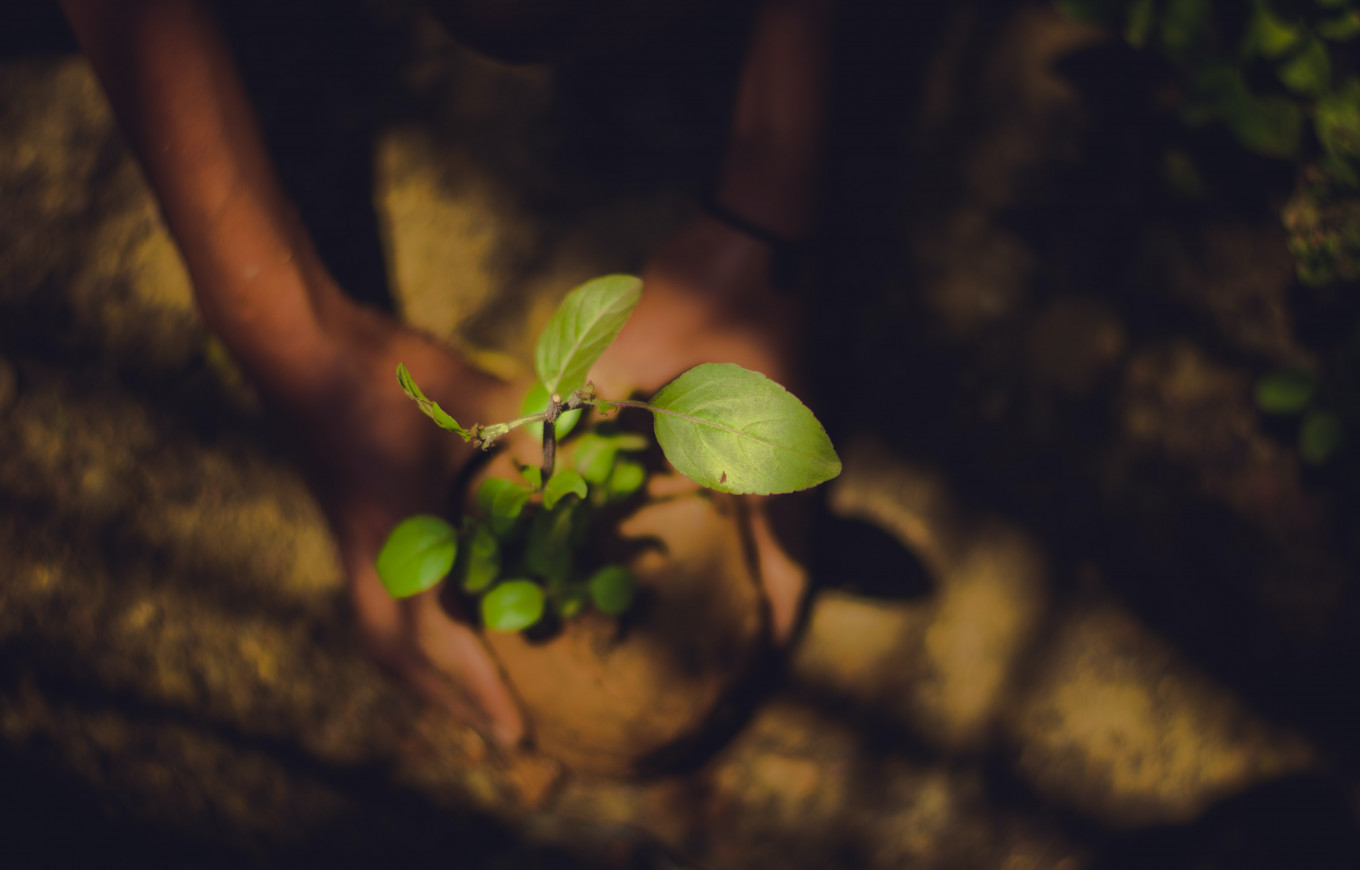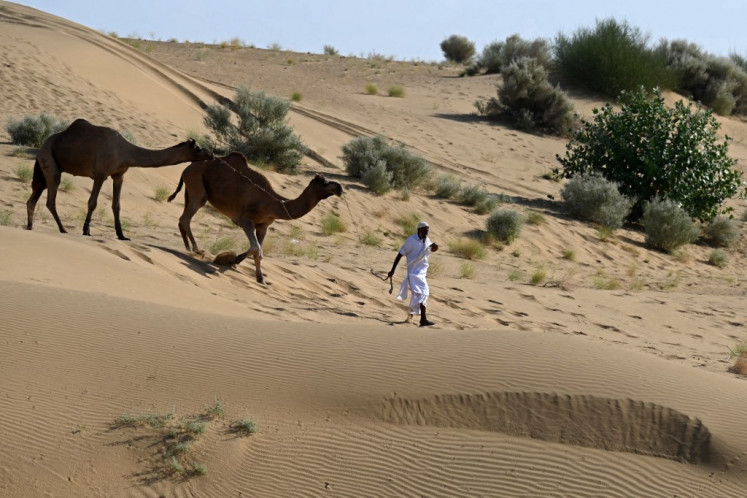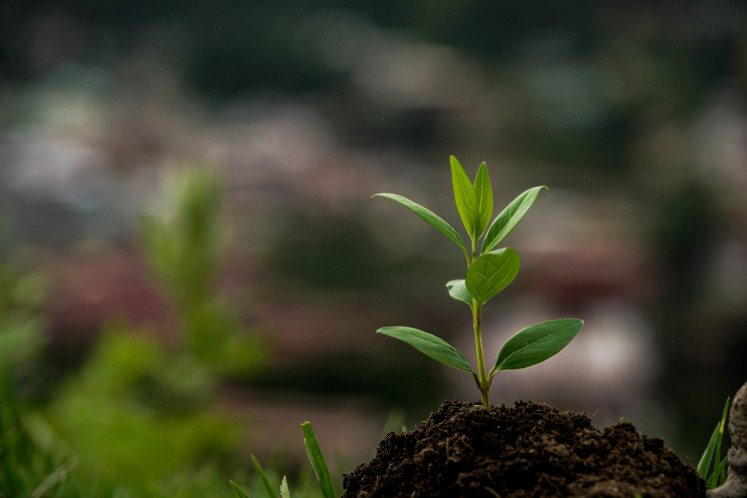Popular Reads
Top Results
Can't find what you're looking for?
View all search resultsPopular Reads
Top Results
Can't find what you're looking for?
View all search resultsIndian traditions entwine with trees in drive to revive land
Change text size
Gift Premium Articles
to Anyone
P
eople in Rajasthan customarily plant trees in celebration, but scientists say that planting seeds and saplings are insufficient to tackle land degradation.
With saplings in hand and faces veiled by colorful saris, Suman and Sarita Takariya's relatives sang traditional songs as the sisters planted small shrubs at their combined pre-wedding celebration in a remote Indian village.
Suman, 21, and Sarita, 19, who wed their husbands in a joint ceremony, are part of a growing trend in the western desert state of Rajasthan, where families are gifting and planting native trees as a new addition to local customs and rituals. The sisters' wedding card said: "Protect nature and nature will protect us.”
"They are a part of our family now," Sarita said as she cleaned her muddy hands after planting an oleander shrub. "We will leave for our in-laws' place, but they [the trees] will be here for our parents."
From weddings, births and funerals to festivals such as Holi and even family achievements like buying a new car, plants and trees have become centerpieces of the local culture, helping to breathe life into the sandy soils of northwestern Rajasthan.
More and more villagers were adopting the practice as they saw the benefits, whether easy access to fruit or cool shade, said Shyam Sunder Jyani, the man behind Familial Forestry, a project that aims to connect trees with families and their rituals.
But soil scientists warn that planting trees alone is not sufficient to combat the growing problem of land degradation.
Rajasthan is India's largest state and also the most degraded when it comes to land, meaning it is suffering a persistent decline in soil quality and fertility. The problem affects people's food security and incomes, and leaves them vulnerable to weather-related disasters such as drought.
Factors such as climate change, overgrazing, excessive cultivation, deforestation and urbanization play a role in land degradation and desertification.
"That is why it's important to build green infrastructure, because it creates a knock-on effect, combating everything from food insecurity to climate change," said Jyani in Bikaner, a city near the rolling dunes of the Thar Desert.
Trees can increase organic content in the ground, recycle nutrients and boost the soil’s capacity to hold water as well as absorb climate change-fueling carbon dioxide emissions.
Soil also naturally absorbs carbon from the atmosphere through a process known as sequestration, which not only reduces harmful greenhouse gases (GHGs) but also creates more fertile soil.
Jyani said a proven way to ensure that more trees were planted was by making trees "green members" of families.
"When we personify a tree, then it connects the family emotionally [...] and that makes the tree a part of them," said the 43-year-old sociology professor.
"By clubbing tree plantation with rituals and festivals, which are pillars of our social life, we make people empathetic toward their local ecology and surroundings."
Fruitful gains
Rajasthan has few forests compared with other states, making up just 8 percent of its total land area, according to government analysis and data.
But in the last 16 years, more than one million families in at least 15,000 villages in the state have planted around 3.5 million saplings as part of the Familial Forestry project.
More than a dozen program participants told the Thomson Reuters Foundation they were literally enjoying the fruits and flowers of their labor, seeing increased ground water levels, improved crop yields and ultimately, more income.
"The trees have changed my life. The fruits are as sweet as the ones I had as a little boy. Birds that I had not seen in decades are back," said teacher Brij Mohan Singh as he gave out saplings to guests at a lunch event for his son's wedding.
"This is for my grandchildren, for the next generation. We have to leave a healthy environment for them, especially as the threat of [global warming] increases every day."
Singh said he had planted five saplings at home and helped his school plant more than 7,000, which provided a cool canopy for students in the scorching summer heat, as temperatures often soared above 50 degrees Celsius.
"They say they feel like they are sitting in an air-conditioned room," he added.
Laxmi Kant Sharma, a professor of earth sciences at Central Rajasthan University, praised Familial Forestry for tapping into India's age-old roots of conserving forest resources. But he warned that it was important to plant only indigenous trees, as others often "become killers of native species of the desert" and could harm wildlife habitats.
Jyani, who won the Land for Life award from the United Nations' anti-desertification agency last year, said he taught communities to plant only native species like khejri, Rajasthan's state tree, which required very little water.
Small step: Soil scientists say that planting trees is only part of the solution to overcoming land degradation. (Unsplash/Pema Gyamtsho)Rich soil, healthy life
India vowed to restore 26 million hectares, or nearly 27 percent, of the country's degraded land by 2030 when it hosted the COP 14 UN Convention to Combat Desertification (UNCCD) in 2019.
Almost 30 percent of the land in India is suffering degradation, a report by the Indian Space Research Organisation (ISRO) found last year.
Rattan Lal, an award-winning Indian-American soil scientist known as the "Godfather of Soil Science", is urging New Delhi to start a scheme that would pay farmers 2,325 rupees (US$30) for each ton of carbon dioxide their land absorbed.
Such carbon credits are becoming increasingly popular financial instruments with companies or governments that want to "offset" their own emissions, by paying others to reduce or prevent the release of GHGs for them.
Carbon credits can support things like solar farms or planting trees, allowing farmers to monetize the carbon their fields soak up, though accurately measuring and verifying emissions reductions remains tricky.
Still, such credit systems could incentivize people "for doing good", Lal said in a video interview from Columbus, Ohio.
Farmers often feed their crop residue to cattle and also use it to make homes and fences, even for cooking, when it could instead be returned to the soil to boost organic matter.
Lal also suggested schools include more nature-oriented literature to spread environmental awareness early on.
Celebrity Indian spiritual leader Jaggi “Sadhguru” Vasudev is on a one-man mission to spotlight the issue. He recently finished a 30,000-kilometer trip by motorcycle across Europe, the Middle East and India to raise awareness about the deteriorating state of the world's soil.
"Healthy soil and healthy life are inextricably connected," Sadhguru said at the annual meeting of the World Economic Forum in Davos last week. "In the next 10 to 15 years, we can make a significant turnaround."
In Rajasthan, Harinath Siddh said he had played his part by gifting and planting saplings at his wedding earlier this month. "I wanted to show [my wife] that I care about the environment," the 25-year-old said.
"And this way, we will be able to care for these trees like they are our own children and watch them grow."













